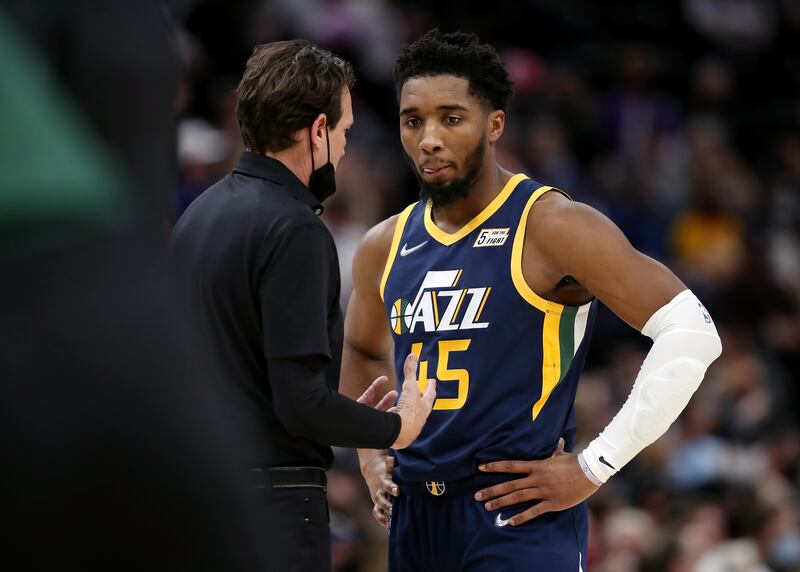If the Utah Jazz were to do the unexpected — at this point, the unthinkable — and run through the playoffs on their way to an NBA title, it would frame a lot of what happened this season in a completely different way than it’s all seen right now.
In 10 years no one would be talking about infighting or tension or problems the Jazz had throughout the 2021-22 season. Instead, fans would be able to regale friends with tales about a Jazz team that nobody believed in, the team that nobody thought could reach the pinnacle of basketball and proved everyone wrong.
It would be a story of resilience and patience and strength of will, and of a team coming together despite all of the odds.
Recently, Jazz coach Quin Snyder emphasized the fact that results in the regular season are not what anyone remembers.
“It’s how you finish. We’re not going to remember January of this year. You won’t, you won’t, none of us will. We’ll be talking about what happened in the playoffs.” — Utah Jazz coach Quin Snyder
“It’s how you finish,” he said. “We’re not going to remember January of this year. You won’t, you won’t, none of us will. We’ll be talking about what happened in the playoffs.”
Coincidentally, Snyder said that on March 29, the night the Jazz blew a 25-point lead to the Los Angeles Clippers — a game that ended in almost exactly the same way that the Jazz’s 2021 playoff run did, against the same team, in the same building.
Snyder is right, if we’re talking about the Jazz winning. But, if the Jazz lose, there are a lot of people who will remember the regular season.
People will remember that this was a season marred by COVID-19 cases that caused teams to play through large stretches without their regular rotation players. People will remember that this Jazz team was one that couldn’t seem to close out games, especially if that’s what ails them in the postseason.
People will remember that this Jazz team went through the regular season not showing the right kind of cohesiveness needed for the playoffs. People will remember this team as the one who couldn’t hold a lead — that their destiny was foreshadowed by a March 29 regular-season game. People will remember.
When Snyder points to people not remembering the regular season, what he’s missing is twofold. First, people remember the season differently after losses, and secondly, they remember seasons that are strung together.
It’s not just a single season but an era.
They might not remember Norvel Pelle playing for the Jazz on a hardship contract in January, but they will remember the feeling of not trusting this team despite the talent and the previous success.
At the top of the list of reasons people will remember this season is the way it all ended last season. The Jazz learned two very difficult lessons — success in the regular season does not guarantee success in the playoffs, and health is more important than anything.
The best winning percentage in franchise history, three All-Stars, Defensive Player of the Year, Sixth Man of the Year, a Coach of the Year candidate were all very nice achievements, but they didn’t stop the Jazz from flaming out in the second round.
All of the offensive and defensive metric success of the Jazz last year did not hold up when they were hobbled in the postseason and unable to compete at their highest level.
It all added up as evidence of a narrative that has been hanging over the Jazz during the Snyder era — the Jazz are a good regular-season team, but they can’t get it done in the playoffs.
“That narrative about our team is fair. ... But, I don’t know. What constitutes success in the playoffs?” Snyder mused on that March night. “You know, it’s really relative to expectation.”
Well, expectations are high. Success in the playoffs for this Jazz team would be the Western Conference Finals. Anything short of that means there hasn’t been progress and that the team has plateaued, and a plateau is failure.
You can’t reach the pinnacle of regular-season success and not be expected to take things to the next level. The Jazz knew that.
They tried to make moves to expand their depth and shore up the rotation. They emphasized the necessity of delivering a healthy roster to the postseason because they knew that success would mean rising above what had been done before.
“I know we’re hungry,” Snyder said. “We need to be healthy. That’s the primary thing.”
And I’ll say it again — if this Jazz team turns it all around and proves everyone wrong, this team will be remembered in an absolutely different light and this season will be looked at through lenses colored by perseverance.
It’s not whether the regular season is remembered, it’s how it’s remembered. And like it or not, the playoffs will be the deciding factor.


